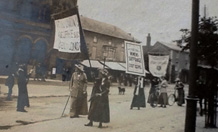-
- Information for new students
- About us
- News
- Events
- Prospective undergraduates
- Prospective postgraduates
- Employability
- Research
- Staff profiles
- Arab and Islamic Studies
- Education
- Law
- Politics
- Sociology, Philosophy and Anthropology
- Strategy and Security Institute
- Exeter Q-Step Centre
- Outreach
- Alumni
- Contact us
- Health and Safety
- Current students
- Staff intranet

Women attending a rally for the right to vote
From suffragettes to Margaret Thatcher and beyond
A century ago thousands of women marched across Britain to Hyde Park in London as part of the Great Suffrage Pilgrimage. A group of South West women walked from Land’s End, sharing the journey with others, holding meetings and rallies and recruiting for the cause.
They stopped at places along route in order to campaign for the vote.
A panel discussion about women’s rights from 1913 to the present day is being hosted by the University of Exeter in collaboration with the Exeter Northcott Theatre on Thursday 23 May at 7pm.
As part of the event there will be a sneak preview of a new play that follows in the footsteps of the women who walked the South West route. It’s called Oxygen, and has been specially commissioned by Dreadnought South West Association a new organisation working with arts and heritage to champion women’s voices and stories. Written by Natalie McGrath, and directed by Josie Sutcliffe the Arts Council of England funded play, celebrates the centenary of The Great 1913 Suffrage Pilgrimage.
The death of Margaret Thatcher also gives a special urgency to the question of how much progress women have made and will form part of the debate which is anticipated to have some lively audience participation. Professor Helen Taylor co-organiser of the event explains the intention of the debate. She said:“This is a wonderful collaboration between the Exeter Northcott, Dreadnought South West and the University’s College of Humanities, to celebrate the role Cornish and Devonian women have played in a century of struggle for women’s political, social and economic rights.”
Feminist broadcaster, writer and critic Bidisha will be in the Chair and other speakers will include Historian and cultural commentator Rachel Holmes (co-editor of the new collection, 50 Shades of Feminism), and Exeter-based community historian Julia Neville, whose research on woman suffrage initially informed the play, which is due to be toured in June and July. Professor Michelle Ryan from the University of Exeter is one of two psychologists to define the“glass cliff”, a situation in which women and other minorities are likely to be placed in leadership positions that are risky or precarious.
While much has changed for women since the time of the suffrage social change has been incredibly variable across different spheres of social life according to Professor Ryan. She said: “While women have, for a long time, represented 50% of employees, they are still woefully represented in prestigious professions and powerful leadership roles. Change in these areas has moved with glacial slowness, and indeed at this rate it may be close to 80 years before we reach equality in these areas.”
Julia Neville’s research into the Devon suffragists who helped organise and galvanise women who walked the South West route of the pilgrimage to London to address the issues of ending child poverty, stopping the white slave trade and ending sweated labour. They recognised that change could only be addressed if women had the right to vote, hence their rally to recruit and to be heard in the face of opposition. Playwright McGrath said: “I saw a sepia photograph of a group of women holding a banner saying, ‘National Union of Women’s Suffrage Societies – Land’s End to London’. I wondered who they were and the idea of forming an organisation grew out of the desire to honour and celebrate the voices and achievement of these women – we hope to do the same with and for many more women in the future”.
The debate ‘Pilgrim’s Progress? From Suffragettes to Margaret Thatcher and Beyond’ is at the Northcott Theatre, Exeter. Tickets can be bought via the Box Office (01392 493493) and the Exeter Northcott Theatre website.
Date: 17 May 2013
